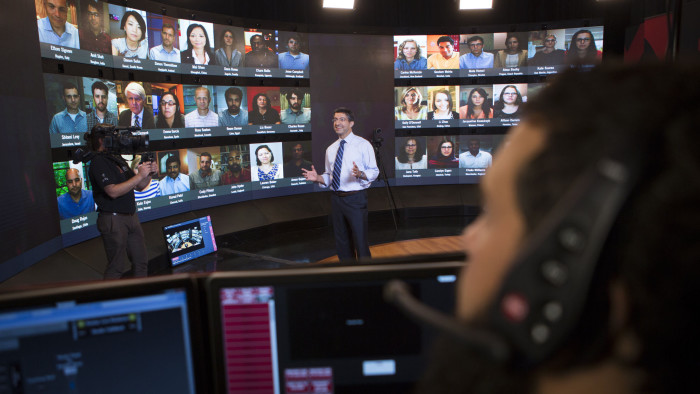Mini-courses pave the way to a full MBA

Roula Khalaf, Editor of the FT, selects her favourite stories in this weekly newsletter.
Matthew Rivers was a police officer in Urbana, a city in Illinois, for nearly a decade before he applied to do an online MBA in 2017. His ambition was one day to lead the police department and he did not want to pause his career to study on campus.
The nearby University of Illinois at Urbana-Champaign offered him a place on its iMBA — an online MBA — with the caveat that Mr Rivers master the fundamentals of business by passing two modules before the start of term in 2018. It was also a way for Mr Rivers, now 38, to prove he could handle academic rigour after years of employment.
He chose courses in corporate finance and investment, which are available for free via Coursera, a digital learning platform, and paid a fee for academic credit (approximately $1,200 per course today) towards the iMBA.
“Online learning is a gateway to an MBA,” he says. Of the 2,882 iMBA students currently enrolled, 35 per cent took a course for credit before applying to the degree programme.
Jeffrey Brown, dean at Urbana-Champaign, likens the courses to Lego building blocks. “They are stackable,” he says. “We are breaking down this traditional idea of one degree into finer pieces that fit around your schedule.”
Business schools are unbundling the MBA to make it more flexible and accessible. Students who take four digital business courses on FutureLearn, an online learning website owned by the UK’s Open University and the Seek Group of employment and education businesses, can earn degree credits for the OU’s online MBA.

They get the credit if they buy a £62 certificate of achievement from FutureLearn for each course, then pay and pass a £540 OU assessment module.
Terry O’Sullivan, senior lecturer in management in the OU’s faculty of business and law, says the initiative, launched in 2016, enables students to test-drive the MBA with minimal financial risk. “Online courses are like a shop window to see what the university offers,” he says.
Other schools are introducing online courses for students with less business experience that act as a primer for an MBA. About 40 per cent of the MBA students who entered Harvard Business School in 2019 took at least one Credential of Readiness (CORe) course after being admitted. For most of them it was a requirement to start the MBA.
The CORe courses, online modules in economics, accounting and business analytics, are free for admitted students but otherwise collectively cost $2,250.
They help students contribute during case discussions in the MBA, when they work as a group to analyse a corporate challenge. “CORe makes discussion more fruitful,” says Patrick Mullane, executive director of Harvard Business School Online.
“It helps the person with no finance background talk intelligently and confidently about net present value alongside someone who worked at Goldman Sachs.”
He adds that CORe can set applicants apart, but it does not guarantee them admission. “It shows intellectual curiosity, ambition, commitment.”

Chioma Isiadinso, chief executive of Expartus, an admissions consultancy, says admissions teams once viewed online courses as inferior to in-person training. This perception is changing as technology improves the digital learning experience.
Ms Isiadinso says 5G mobile networks are a “game-changer”, enabling more seamless interaction between online students with less delay.
At Imperial College Business School in London, admitted MBA students can take free online courses in maths, finance, data analysis and accounting.
Leila Guerra, associate dean, says the classes have broadened the range of backgrounds on the MBA, adding doctors and artists. “They would not otherwise meet the admissions criteria, as they have no business experience,” she says. Their experience in other areas, though, benefits the course, with diverse perspectives enhancing group discussions.
The iMBA gave Mr Rivers the confidence to switch careers. He moved to Dallas in Texas, where he investigates collisions involving city-owned vehicles. Mr Rivers plans to apply for business administration jobs in the private sector when he graduates this year.
But some schools have struggled to convert students from online courses to degrees. In 2017, the Thunderbird School of Global Management, which is owned by Arizona State University, launched a “MicroMasters” in global business leader3ship, an online course on the edX platform.
It grants academic credit towards a digital masters degree in applied leadership and management at Thunderbird. Yet to date only about 5 per cent of the 553 people who enrolled for the MicroMasters have done so for the masters, despite a $9,000 discount on tuition fees through this route.
Sanjeev Khagram, dean at Thunderbird, is not concerned because the idea is to widen access through a relatively cheap taster course.
Some students are satisfied with the MicroMasters, he adds, and achieve their aims, whether a career switch, promotion or pay rise. For those who want to get ahead in business, online learning may be a win-win.
Comments